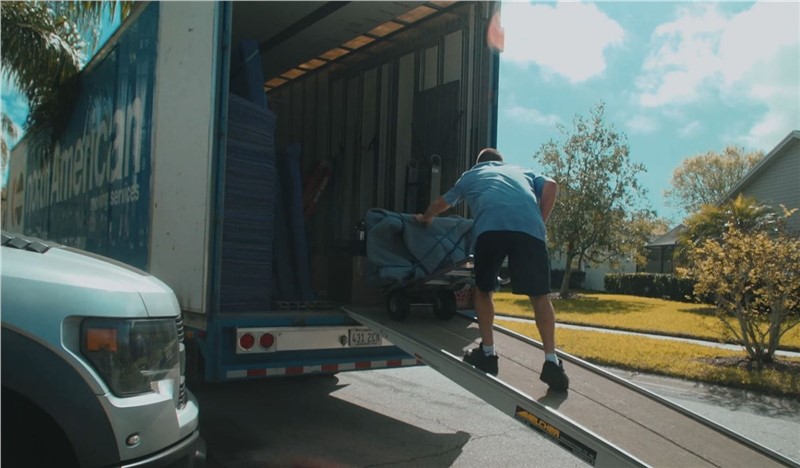Comprehending the Inclusions of moving and Freight Forwarding worldwide of Residential and Worldwide Delivery
Guiding with the complexities of moving and Freight forwarding can be challenging. Both procedures include distinct treatments and demands that are critical for effective transport. Recognizing the distinctions in logistics, paperwork, and threat administration is vital for individuals and organizations alike. This knowledge can considerably affect the effectiveness and safety of deliveries. Many are not aware of the specific components that affect the overall experience and outcomes. What elements should one think about to assure a smooth transition?
The Basics of moving and Freight Forwarding
moving and Freight forwarding are basic components of the global logistics industry. They help with the transfer of products and personal items throughout residential and worldwide boundaries. moving mainly includes the relocation of people or families, incorporating domestic and business needs. It normally includes packaging, packing, delivering, and unboxing products at the location. In contrast, Freight forwarding is concentrated on the delivery of items, commonly in mass, utilizing different transportation settings, such as sea, air, or land.freight forwarders work as intermediaries, collaborating logistics to ensure timely delivery while maneuvering through facility regulations and personalizeds treatments. Both processes need careful preparation, company, and communication to assure performance and decrease disruptions. Comprehending these principles is important for anybody associated with logistics, as they prepared for even more sophisticated aspects of delivery and transport administration.
Secret Components of Freight Forwarding Services
Freight forwarding services encompass a number of essential parts that guarantee smooth transport of products. Trick duties of Freight forwarders include managing logistics, collaborating shipments, and managing customizeds clearance. Furthermore, comprehending vital shipping documentation is imperative for compliance and reliable activity of cargo.
Freight Forwarder Responsibilities
A reliable Freight forwarder plays a necessary function in collaborating the transportation of goods, guaranteeing that shipments are taken care of efficiently and in compliance with guidelines. Their duties include numerous crucial jobs, including choosing optimal transportation courses, discussing Freight rates, and handling logistics. They serve as middlemans in between carriers and shippers, ensuring that cargo is correctly packaged and classified for safe transit. Furthermore, Freight forwarders track deliveries, giving updates to customers about the status and expected delivery times. They likewise evaluate and handle dangers connected with transportation, advising insurance choices as needed. By helping with communication and documentation, Freight forwarders streamline the shipping procedure, decreasing prospective hold-ups and improving total supply chain efficiency.
Delivering Documentation Essentials

Understanding Personalizeds Clearance and Documentation
Precise paperwork is vital in the custom-mades clearance process, as it assures conformity with various policies. An introduction of customizeds laws highlights the complexities dealt with by carriers and Freight forwarders. Common clearance challenges can considerably influence shipment timelines and expenses, making understanding this aspect crucial for efficient logistics.
Value of Accurate Documents
Steering via the complexities of international shipping requires an eager understanding of personalizeds clearance and the crucial duty of paperwork. Precise documents is crucial for making sure that deliveries adhere to guidelines and reach their destinations immediately. Effectively prepared files, including costs of lading, industrial billings, and packing checklists, promote smooth communications with customizeds authorities. Errors can cause shipment hold-ups, fines, or even confiscation of products. Additionally, thorough documentation help in tracking shipments and fixing disputes. Companies involved in moving and Freight forwarding have to focus on precise documentation methods to navigate the complex landscape of international shipping efficiently. This diligence not just enhances operations but also improves customer fulfillment by guaranteeing prompt distribution.
Customizeds Laws Overview
Guiding personalizeds laws is an important aspect of global trade that straight influences the success of moving and Freight forwarding operations. Efficient custom-mades clearance calls for an understanding of different guidelines, including tariffs, responsibilities, and import/export restrictions. Exact paperwork is essential, as it assures conformity with lawful needs and facilitates the effective motion of products across borders. Secret papers frequently include industrial invoices, packing listings, and expenses of lading, which supply detailed information about the shipment. In addition, custom-mades brokers play an essential function in steering complex regulations, acting as intermediaries in between shippers and customizeds authorities. By preserving complete understanding of custom-mades processes, organizations can significantly reduce delays and reduce expenses related to global shipping.
Common Clearance Challenges
Countless obstacles can arise throughout the customs clearance procedure, typically making complex the movement of goods across borders. One significant problem wants documentation, which move agency can lead to hold-ups and charges. Importers and merchants must guarantee all required documentation, such as invoices, packaging listings, and certificates of beginning, is complete and accurate. Additionally, inconsistencies in evaluation can trigger analysis from customizeds authorities, causing added responsibilities or examinations. Language barriers may additionally position challenges, as miscommunication can cause misunderstandings relating to regulations. Changes in customs guidelines can create confusion, demanding constant alertness by shippers. Eventually, getting rid of these clearance tests requires thorough preparation and a clear understanding of custom-mades needs to facilitate smooth international deals.
Packaging and Identifying Needs
Although commonly overlooked, packaging and labeling demands play a necessary duty in the shipping procedure, ensuring that goods are protected and conveniently recognizable throughout their journey. Correct packaging safeguards items from damages during transportation, while also promoting reliable handling and storage. Making use of appropriate products, such as bubble wrap, foam, or tough boxes, can avoid damage and loss.Labeling is similarly important. Precise and clear labels share crucial details, including the destination, taking care of guidelines, and materials. Tags need to follow regulations details to global and domestic shipping, which might include unsafe materials identification or customizeds declarations.Moreover, standardized labeling methods streamline the tracking procedure and enhance overall logistics effectiveness. By sticking to packaging and labeling demands, companies reduce the threat of delays, damage, or misdelivery. Ultimately, these techniques contribute substantially to the success of moving and Freight forwarding operations, ensuring a seamless delivery experience for all parties entailed
Tracking Deliveries: Relevance and Approaches
Effective packaging and labeling set the structure for successful shipment administration, however tracking deliveries is just as necessary in the delivery process. Delivery monitoring offers real-time presence, which helps services and customers monitor the progression of their goods. This transparency boosts consumer fulfillment, since clients can remain educated regarding delivery timelines and any type of possible delays.Several methods assist in reliable monitoring. Barcode scanning is a common technique, making use of one-of-a-kind identifiers to keep track of bundles throughout their trip. Additionally, general practitioner innovation makes it possible for precise place monitoring, allowing for timely updates and boosted logistics administration. Numerous delivery business now provide digital platforms and mobile applications that supply customers with very easy access to tracking information.The relevance of delivery tracking can not be overemphasized; it lessens the threat of shed or harmed goods, boosts functional effectiveness, and cultivates depend on in between recipients and shippers. For that reason, incorporating efficient tracking methods is vital for effective residential and global shipping operations.
Insurance policy Options for Your Product
Protecting insurance for products en route is a crucial factor to consider for individuals and businesses alike. Insurance policy alternatives vary based on the kind of shipment, value of products, and details threats involved. Usual types include copyright responsibility, which covers loss or damage while en route, and full-value insurance, supplying substantial protection for the complete value of the goods.Shippers might additionally consider aquatic insurance coverage for worldwide deliveries, securing against dangers connected with sea transportation. It is vital to examine the details requirements of the shipment and evaluate the terms of any policy.Furthermore, recognizing exemptions and limitations is important to prevent prospective spaces in insurance coverage. Shippers must involve with insurance policy experts to explore tailored services that fit their special scenarios. Inevitably, buying the appropriate insurance can reduce monetary threats and provide assurance during the shipping process.
Selecting the Right moving and Freight Forwarding Service
When choosing a relocating and Freight forwarding solution, it is vital for organizations and people to very carefully examine their particular requirements and priorities. Factors such as the volume of products, location, and timeline play a significant duty in this decision-making process. Looking into various service providers is a good idea; contrasting their services, rates, my site and customer evaluations can expose important insights.Additionally, it is required to consider the experience and expertise of the company in handling details sorts of cargo, especially for international deliveries that may involve customizeds clearance. Transparency in rates, consisting of any type of covert charges, ought to also be scrutinized.Furthermore, evaluating the degree of client support provided is necessary, as timely interaction can reduce issues throughout transit (freight shipping). Lastly, validating the availability of insurance policy choices ensures that items are safeguarded throughout the delivery process. By taking these companies, people and actions can make educated options that straighten with their logistics requirements
Regularly Asked Concerns
What Kinds of Product Can Be Shipped Internationally?

Exactly How Do Shipping Expenses Differ In Between Various Service Providers?
Shipping prices differ significantly in between providers due to factors such as solution rate, cargo kind, range, and additional solutions offered. Each copyright's see this here pricing design reflects these variables, affecting overall delivery costs for clients.
Can I Ship Hazardous Materials or Perishables?
Delivering dangerous products and perishables is subject to stringent laws. Carriers frequently call for certain packaging, labeling, and paperwork. Carriers must ensure compliance with worldwide and neighborhood legislations to prevent charges and assure safe transport.
What Should I Do if My Delivery Is Postponed?
When encountered with a delivery hold-up, one must initially get in touch with the service provider for updates. Assess any notices obtained, assess different options, and keep all celebrations notified about the circumstance to reduce disruptions.
Exist Weight Purview for Shipping Containers?
Weight limits for shipping containers vary relying on variables like container size and shipping policies. Generally, conventional containers have a maximum gross weight of around 30,000 to 32,000 kgs to guarantee risk-free transportation and handling. In comparison, Freight forwarding is concentrated on the delivery of products, usually in mass, using various transportation modes, such as air, sea, or land.Freight forwarders act as middlemans, working with logistics to guarantee timely delivery while maneuvering through complex regulations and personalizeds treatments. Secret responsibilities of Freight forwarders consist of handling logistics, collaborating deliveries, and managing customs clearance. A trustworthy Freight forwarder plays a crucial duty in coordinating the transport of items, making sure that shipments are dealt with effectively and in compliance with regulations. Reliable product packaging and labeling established the foundation for successful delivery management, yet tracking shipments is just as necessary in the delivery procedure. Many shipping business currently supply digital platforms and mobile applications that give users with easy accessibility to tracking information.The relevance of shipment monitoring can not be overstated; it reduces the threat of lost or harmed products, boosts functional effectiveness, and promotes trust in between shippers and receivers.